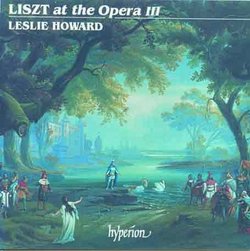| All Artists: Franz Liszt, Leslie Howard Title: Liszt at the Opera III Members Wishing: 1 Total Copies: 0 Label: Hyperion UK Original Release Date: 1/1/1996 Re-Release Date: 1/24/1995 Album Type: Import Genre: Classical Styles: Opera & Classical Vocal, Chamber Music, Historical Periods, Classical (c.1770-1830) Number of Discs: 2 SwapaCD Credits: 2 UPC: 034571168616 |
Search - Franz Liszt, Leslie Howard :: Liszt at the Opera III
 | Franz Liszt, Leslie Howard Liszt at the Opera III Genre: Classical
|
Larger Image |
CD Details |
CD ReviewsLiszt the Impresario - Part 3 Hexameron | 08/21/2006 (5 out of 5 stars) "Leslie Howard's previous two "Liszt at the Opera" series (Liszt at the Opera: Operatic Fantasies, Paraphrases, and Transcriptions, Vol. I (Complete Music for Solo Piano, Vol. 6) and Liszt at the Opera II) have proved how underrated and neglected Liszt's operatic paraphrases and transcriptions are. This third volume argues the case even further. The transcription of Weber's "Oberon" overture is faithfully rendered and Liszt's pianistic adaptation of this inherently excellent music is masterful; he fleshes out enough of the texture to match the thickness of an orchestra. With all the recordings of Liszt's war-horse, the "Reminiscences" of Don Juan, few are aware that there is another large-scale Mozart fantasy. Liszt's "Fantasy on Themes from Figaro and Don Giovanni" is an unpublished and unfinished work, but Howard presents a convincing realization. Interestingly, Busoni used material from this fantasy for his own "Figaro Fantasy," although he edited the Don Giovanni content and shortened the work. Busoni aside, Liszt's 22-minute fantasy is original and exciting. Cherubino's "Voi che sapete" and Figaro's "Non piu andrai" are prevalent throughout, and Liszt's dramatic embellishments and elaborations of these immortal Mozart tunes are brilliant.
The Paraphrases of Verdi's "Ernani," "Il Trovatore" and "Rigoletto" are stunning works. In the first, Liszt takes us through a tragic and dramatic journey with gorgeous respites. In the second, Verdi's "Miserere" becomes a colossus of somberness and gravity. Liszt's piano writing is brutally dark for his time. It must have been a shock for mid-19th century audiences to hear such heavy sonorities and low bass-register rumblings. The most famous of this Verdi paraphrase triptych is the "Rigoletto," which few commercial pianists avoid. Howard produces an exceptional delivery with sufficient bravura and surprising musicality. Even after retiring from the virtuoso pianist stage, Liszt returned to Verdi again for his last operatic fantasy, the Reminiscences of "Simon Boccanegra" in 1882. It is original, impressive and full of radical harmonic treatment that only enhances Verdi's music content. Liszt's most popular operatic fantasy in his early touring days was the Reminiscences of Meyerbeer's "Robert le Diable," an opera of excessive popularity in its time. Crowds at the unveiling of the Beethoven monument in Bonn expected Liszt and Berlioz to perform works of the German master, but couldn't contain their cries for Liszt to play the Meyerbeer "Valse infernale" instead. This "Valse infernale" has the devilish character of Liszt's own "Scherzo and March" or even some of the Mephisto Waltzes and is gratifying virtuoso music. I feel the "Cavatine" transcription that Liszt grafted onto the "Valse infernale" is a phenomenal gem of intoxicating beauty. If only pianists would exhibit this heart-rending piece at recitals more often. Liszt's fantasy on Gounod's "Romeo et Juliette" is strange as it uses a few motives from the opera but unwinds like a novel improvisation. The tender and soothing nature of this music is comparable to the Liebestraumen, Consolations and gentle pieces from the "Harmonies Poetiques et Religieuses." I think Liszt beats the romantic impact of Chopin's music and surpasses the passionately-charged climaxes of Wagner. The wealth of musical ideas that Liszt weaves into this sublime tapestry makes the fantasy one of the finest on this recording. The Wagner transcriptions are enthralling and highly effective on the piano; Liszt's arrangements of numbers from "Lohengrin" are literal and expertly done. Wagner fans can expect fidelity to the text in an enthusiastic and pianistic cloth. Each number has its own individual merits that Liszt highlights with exquisite taste. It is refreshing to hear Wagner's "Bridal March" (heard at every wedding now) in Liszt's transcription, a marriage of grace and charming virtuosity. Liszt rarely wrote full-blown fantasies on Wagner's music, but makes an exception with the "Fantasy on Motives from Rienzi." This is full-blooded grandiose Liszt with tinges of poetry. The work is majestic, serious and deeply reflective. Bottom line: Liszt fans who have not heard these operatic piano works are missing out on a neglected treasure cache in Liszt's oeuvre. Both lovers and laymen of opera should revel in the hall-of-fame opera tunes, which Liszt pays homage to and retreats with pianistic genius. All works are stellar, startlingly expressive, and premium in quality." |

 Track Listings (7) - Disc #1
Track Listings (7) - Disc #1